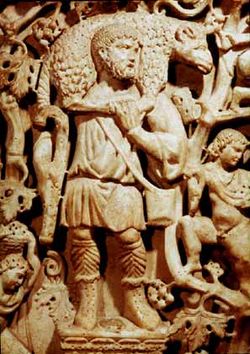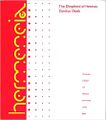Category:Shepherd of Hermas (text)
The Shepherd of Hermas is an early Christian document, included in collections of Apostolic Fathers.
- See Online Text
Overview
THE THREE CHRISTIAN PARTIES OF THE 2ND CENTURY
JUDEO-CHRISTIANITY
- Jesus is a pre-existent archangel (created, not generated)
- Christianity as a movement within Judaism
- Obedience to the Mosaic Torah
- Family of Jesus
GNOSTICISM
- Jesus is divine but did not come in the flesh (there is no creation).
- Christianity as an anti-Jewish movement (rejection of Judaism)
- Mysticism
- Charismatic Leadership
“ORTHODOX” CHRISTIANITY
- Jesus is as divine as the Father (generated not created). Jesus came in the Flesh (became created)
- Christianity as the "new" Israel (rooted in the ancient Jewish tradition)
- Apostolic Succession
THE NATURE OF THE SON, JESUS
“All who repent with all their heart will protect themselves from [evil] , for I will be with them and will keep them safe, for they were all justified by the most holy angel [i.e. Jesus]”. “The Son himself cleansed the people’s sins with great labor and enduring much toil… God took his Son and the glorious angels as counselors” (Hermas 59) “The Son of God is far older than all his creation, with the result that he was the Father’s counselor in his creation” (Hermas 89)
[In the Gospel of the Ebionites] they say that [Jesus] is not begotten (generated) by God the Father but created like one of the archangels, being greater than they. He rules over the angels and beings created by God and he came… “to abolish the sacrifices” (Epiphanius on the Ebionites).
FORGIVENESS OF SINS WITHIN THE CHURCH, AFTER BAPTISM
“There is a man living with his father’s wife… You are to hand this man over to Satan for the destruction of the flesh, so that his spirit may be saved in the day of the Lord” (1Cor 5:1-5). “[There is] who eats the bread or drinks the cup of the Lord in an unworthy manner… For this reason many of you are weak and ill, and some have died… When we are judged by the Lord, we are disciplined so that we may not be condemned along with the world” (1Cor 11:27-32).
“The prayer of the faith will save the sick… and anyone who has committed sins will be forgiven. Therefore confess your sins to one another, and pray for one another, so that you may be healed. The prayer of the righteous is powerful and effective” (James 5:15-16).
“If you see your brother or sister committing what is not a mortal sin, you will ask, and God will give life to such a one—to those whose sin is not mortal. There is sin that is mortal. I do not say that you should pray about that. All wrongdoing is sin, but there is sin that is not mortal” (1 John 5:16-17).
“I have heard from some teachers, Lord - I said – that there is no repentance apart from the one that came when we descended into the water and received forgiveness for the sins formerly committed” He said to me: “You have heard well, for that is so. For the one who has received forgiveness of sins must sin no more, but live in holiness… But the Lord has given to those who were called before these days an opportunity to repent. For the Lord… recognized the weakness of humans and the intricate plots of the devil… Whoever is tempted by the devil and sins after that great and reverent calling has one repentance” (Hermas 31).
“The one who has sinned and repented must be taken back... But not repeatedly; for there is only one repentance for God’s servants” (Hermas 29)
“All the sins which have previously committed will be forgiven them. Indeed all the saints [i.e. the baptized Christians] who have sinned up to this day will be forgiven, if they repent with all their heart and drive away double-mindedness from their heart… If sin still occurs, now that this day has been set a limit, they will not find salvation, for repentance for the righteous [i.e. the baptized Christians] is at an end; the days of repentance for all the saints are over, although for the heathen [i.e. those who have never been baptized] there is the possibility of repentance until the last day” (Hermas 6).
“But if after hearing them you do not repent, but continue to add to your sins, you will receive from the Lord the opposite. All these things the shepherd, the angel of repentance, commanded me to write” (Hermas 25).
THE RICH AND THE POOR
“Those who are rich in this world cannot become useful to God unless their riches are cut away. Learn first from yourself: when you were rich, you were useless, but now you are useful and beneficial to life” (Hermas 14)
“Do not partake of God’s creation in abundance by yourselves, but also share with those in need. For by overeating some people bring on themselves fleshly weaknesses and injure their flesh, while the flesh of those who don’t have anything to eat is injured because they do not have enough food, and their body is wasting away” (Hermas 17).
“The rich man has much wealth, but is poor in the things of the Lord, being distracted by his wealth, and he has very little confession and prayer with the Lord… while the intercession of the poor is acceptable and rich before God… So the poor, by appealing to the Lord on behalf of the rich, complement their wealth, and again, the rich, by proving for the needs of the poor, complement their souls. So then both become partners in the righteous work.” (Hermas 51)
FALSE AND TRUE PROPHETS
“[The false prophet] wants to have a seat of honor, and immediately is arrogant and shameless and talkative and well acquainted with many luxuries and with many other pleasures, and receives money for his prophesying, and if he does not receive money, he does not prophesy” (Hermas 11).
External links
Pages in category "Shepherd of Hermas (text)"
The following 10 pages are in this category, out of 10 total.
1
- Der Hirt des Hermas (1868 Zahn), book
- Hêrmâ Nabî: The Ethiopic Version of Pastor Hermae (1876 Schodde), book
- Barnabas, Hermas and the Didache (1920 Robinson), book
- Der Hirt des Hermas (1923 Dibelius), book
- Le pasteur (1958 Joly), book
- Hermas and Christian Prophecy (1973 Reiling), book
- Rich and Poor in the Shepherd of Hermas (1983 Osiek), book
- L'unité du Pasteur d'Hermas (1992 Henne) book
- Shepherd of Hermas: The Gentle Apocalypse (1992 Jardine), book
- The Ladies and the Cities (1995 Humphrey), book
Media in category "Shepherd of Hermas (text)"
The following 4 files are in this category, out of 4 total.
- 1912 * Lake.jpg 304 × 475; 28 KB
- 1964-E * Grant.jpg 907 × 1,360; 189 KB
- 1999 Osiek.jpg 443 × 500; 19 KB
- 2003 * Ehrman 3.jpg 947 × 1,417; 189 KB




